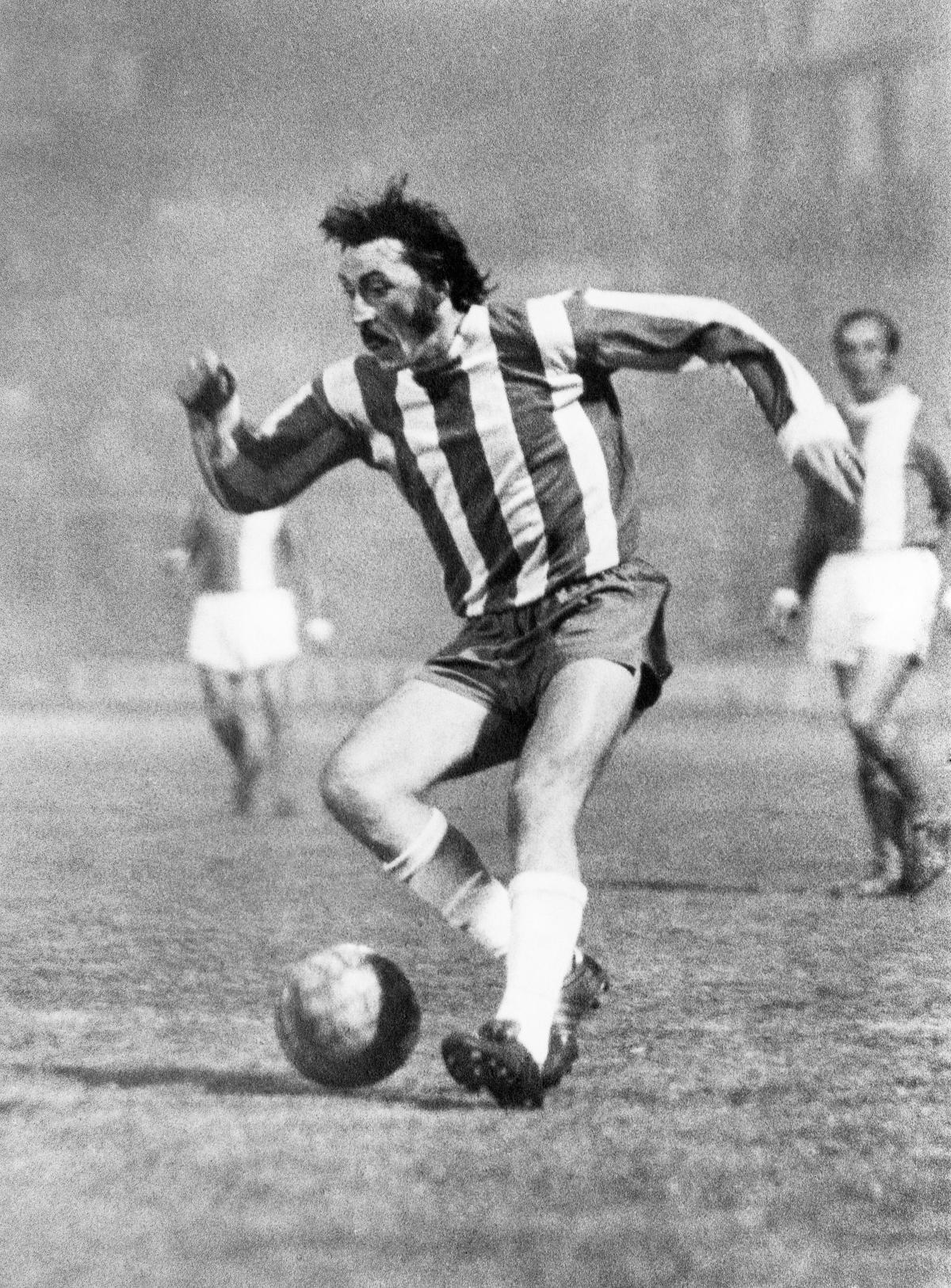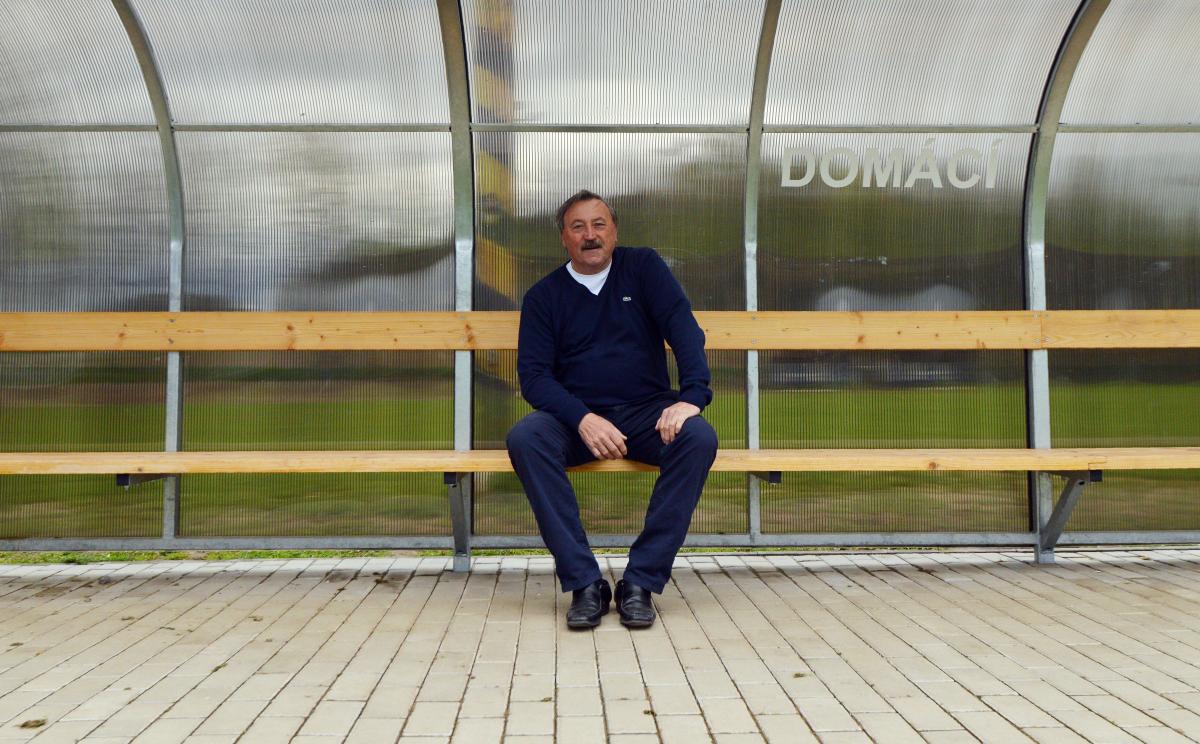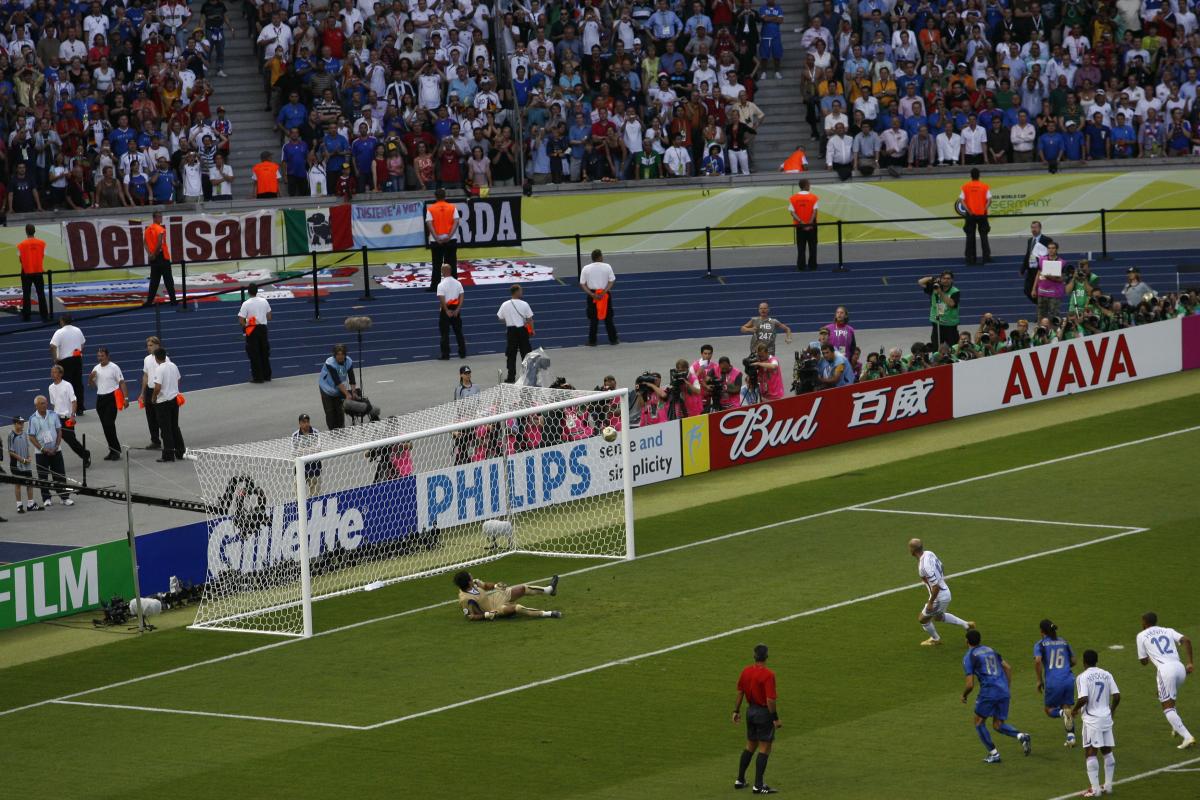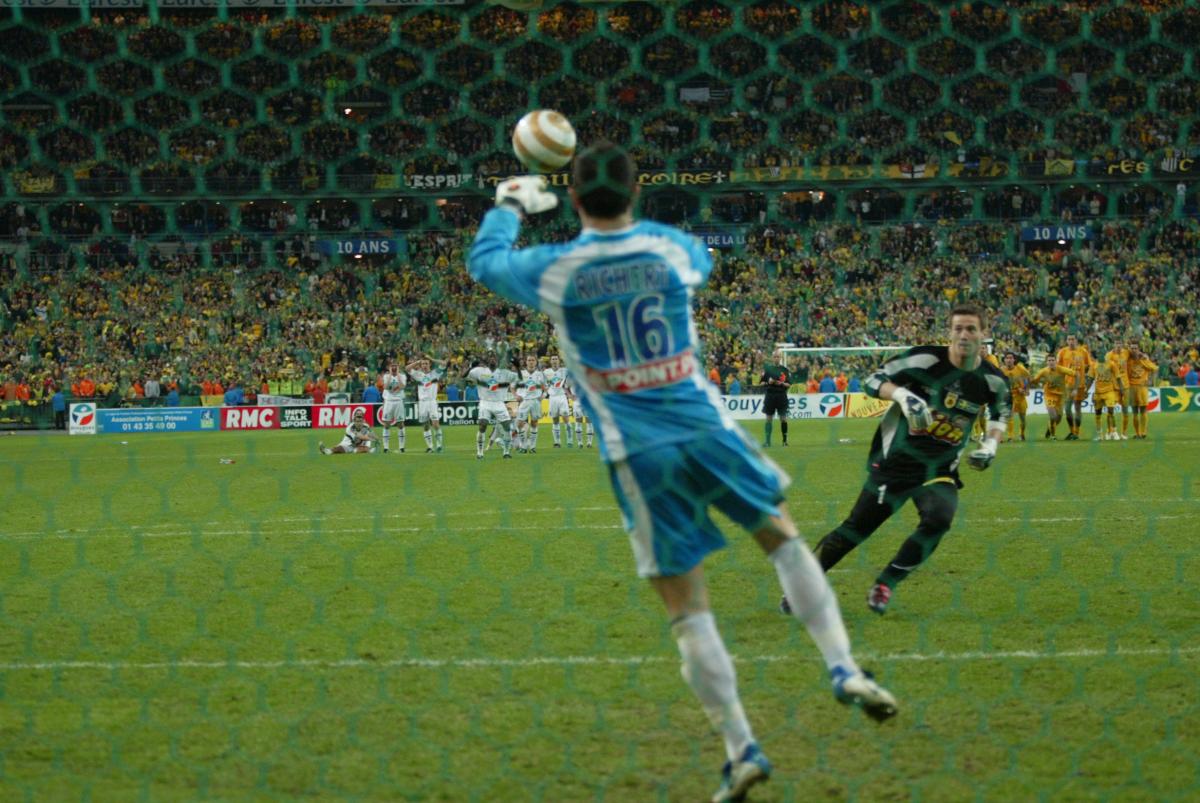Doing the Panenka
Antonín Panenka achieved international football stardom with a ruse that scored a critical goal for the Czechoslovak national team in 1976. He talks about the childhood that formed him as a sportsman and how he invented the penalty kick that bears his name.
The final match of the 1976 UEFA European Football Championship in Belgrade was a historic match. The powerhouse West Germans and underdog Czechoslovaks fought to a 2:2 tie unbroken after 30 minutes of extra time, making it the first time that a major international title would be decided by a penalty shootout. Against the world’s best goalkeeper, Sepp Maier, in the biggest game of his career, with the whole tournament riding on his final kick, Antonín Panenka took a long running start and charged the ball ferociously. Only at the last minute, as Maier started to dive for the expected cannon-ball blast, did Panenka chip the ball delicately to the centre of the goal to win Czechoslovakia its first and only Euro trophy. Countless other players after him have tried to execute this kick, and many have failed, but the whole world knows it as the ‘Panenka penalty’, and the 1976 original is still regarded as one of the greatest penalty kicks in football history. We spoke with Panenka about sports, creativity and his legendary move.
Did you start playing sports as a kid?
I learned all kinds of sports on my own: swimming, skating, riding a bike… I played football with older boys regularly. I guess I have a God-given talent for sports and a kind of creativity, sports ideas. I guess maybe I was born with quite a bit of that. And it’s true that even as a little boy I was always playing matches like kids do, one street against another, one neighbourhood against another, and pretty often on a weaker team that I helped to win. When we got together in the park I would choose the weakest boy and play with him, maybe just the two of us against five. So then everybody wanted me to play with them. For example, I remember once at one of those street games, the team my friend was playing for was losing 0:2, and after I joined in, it turned out exactly the opposite, and we won with flying colours, 13:2. I guess it was because I was just crazier, stubborner, maybe more skilful than the others.

Panenka played for Bohemians Prague for most of his career, joining the club in 1967, and today he is the president of the club. (Photo: Jiří Koliš)
Did you try any other sports besides football?
Of course in the summer there was football, and in the winter there was hockey. As a youth I started with football for Bohemians Prague [editor’s note: known today for legal reasons as Bohemians Prague 1905], and I played hockey for Dukla Prague. In fact we got as far as the youth leagues where there were guys who played hockey as their main sport. I remember that we didn’t have any equipment. We would borrow hockey sticks on the bench, and I played in plain trousers, no shin guards. When somebody took a shot I used to flatten myself against the boards so that nobody would hit me in the shins with the puck. Looking back on it now, I think that it was a huge learning experience, and my sports personality, so to speak, was formed there. As a footballer I had to fight for myself, get the ball, zig-zag down the pitch, finish off plays, because I had only myself to depend on. I basically spent five, six, seven hours on the field daily. I think that’s missing nowadays. Young players spend only four or five hours on the field a week, so they don’t have that extra skill, that zeal for the game. They’re missing those hours that I spent on the pitch.
You were fairly young when you started to play on the men’s team.
What I always liked was ball-handling, practices, matches… What I never liked, on the other hand, was strength training and athletics. That was stifling for me. I was never much the combative type, I wasn’t a power player. I didn’t have the drive, and I never ran too much, I just had the physique for my style of play and for working with teammates, more than a physical approach to football. Ball skills were my forte, and I told myself that I had to perfect the things that I knew how do to advance myself on the field.
At Bohemians there was a youth league coach who opened my eyes with one interesting thing. We were playing a match and I messed up one pass—it wasn’t even a tricky one—and at halftime he cussed me out. And I felt like that wasn’t quite right, so I went and asked him: ‘The other guys messed up a lot more passes, and I messed up one, and you yelled at me. Isn’t that unfair?’ And he answered me: ‘Yes, you’re right, but you have to realise that your technique is so good, and you so surpass the others with your kicking technique that you can’t allow yourself to mess up. They can; they don’t know any better.’ Well then, after that I tried to live by that advice for my whole career.

At winter training they always did physical strength and fitness tests, and usually it turned out that [Slovak fullback Karol] Dobiáš and Panenka were in last and second-to-last place. But it was interesting that when the season ended and the coach was evaluating who the best players were on the field, then that list turned around 180 degrees. I think that physically, for my level I was pretty well prepared for playing first-league football. Not as well prepared as the others, but on the other hand I scored a lot of goals and had a lot of assists, so everyone was satisfied.
In your era football was mainly about the joy of the game, and maybe today spectators don’t get so much of that, don’t you think?
Well, maybe, but football is a completely different thing today. It’s such a strong commercial commodity that for young players professional football is really hard work, physically and especially mentally. We played football because we loved it, and the advantage was that we could make a living at it, get some benefits from it, and most of all, we didn’t have to go to work. Of course the best players today have conditions that we never even dreamed of back then. But when I look at it from a different angle, for example how we won the European Championship in Belgrade, if you offered any player a hundred million crowns for that, he’d take the title instead. Everyone needs money, of course, but money certainly isn’t everything. There has to be a little something more and your attitude has to be a little different.
‘After every training session, I’d stay behind with our keeper, and we’d have a spot-kick competition. To make it more fun, we’d gamble: chocolate, beer or cash. It was costing me money, because I kept losing. I’d lie in bed at night and worry about it. Then it came to me. He was a keeper who often waited until the last second and then guess either left or right. So it made sense to put it down the middle. Except if you do that with a normal shot, the keeper can reflexively lift a leg and save it. But if you float it gently, he can’t.’ The only negative, Panenka says, is that he ‘got really fat from the chocolate and the beer.’
Did you know that there is a magazine in Spain called Panenka?
Of course. It’s a big honour for me. Some young journalists from Spain called me because they wanted to do a new style of football magazine, and they chose my name for it. I was really surprised because I said to myself, it’s been so long since I played, and what’s more, these guys are from Spain where they have maybe the best players in the world, and they’re choosing someone from the Czech Republic? So I asked them about it, and they told me that for them, my penalty kick in Belgrade and my whole career, about which they knew absolutely everything, were so inspiring that my name was the only choice for their innovative project. That made me really happy, and I agreed, but that’s not all that happened. In fact in Holland there’s another football magazine named Panenka, and a restaurant named Panenka in Madrid, and even a sports bar in Rotterdam that also bears my name. So I guess in Holland and Spain they like me.
And that brings us to that famous penalty at the 1976 UEFA European Football Championship in Belgrade.
Never in my life did I imagine that one penalty could have such an impact. Say what you like, that event became part of football history.
I noticed that the first one to try it out at a championship game was your teammate Štefan ‘Pišta’ Ivančík playing against Lokomotiva Košice in 1975. You couldn’t play that day because of an injury, and he used your trick. What was the reaction, and weren’t you angry that someone else was the first to use your invention?
Not at all. We were always practising those kinds of things between matches, and I don’t even remember who was the first to use it in a game. It’s true that I often stayed on the field after practices with our goalkeeper Zdeněk Hruška, and we came up with a kind of penalty-kicking game. To liven it up a bit we played for beer, or chocolate or money. And because I was always losing these games I spent evenings thinking about what to do so I could win some too. And out of that ferment was born the idea of trying that trick. Because the goalie never stood still, it occurred to me to just lightly chip the ball; he’d jump to one side, and the ball would sail gently into the middle of the goal. Once he jumps, he can’t turn back in mid-air, it’s impossible.

Many great football players have tried the iconic penalty kick, which requires steady nerves as well as top-notch acting skills. Above, Gianluigi Buffon, the best goalkeeper of his time, watching Zinédine Zidane outwit him at the 2006 FIFA World Cup Final. (Photo courtesy of Presse Sports.)
And was there some method to it that you perfected?
Of course, the kicker has to get a fast running start to spook the goalie, who anticipates a hard blow and throws himself towards the post. Except instead of the expected bang, you just give the ball a gentle undercut and then sit back and enjoy watching it fly into the goal. But it’s not as easy as it appears at first glance. Basically, I practised it diligently every day for two years. As the kicker you have to convince the goalie that the shot is going to one side. In other words, I have to use everything to deceive him: my behaviour, my eyes, my movement, my running start. I have to commit to the situation. And then at the very last moment, that’s the easy part when you just slow your leg down a bit and send the ball lightly to the centre. Back then there were rules in my favour that don’t apply any more. The goalkeeper had to stand in one place on the goal line, wasn’t allowed to run forward and wasn’t even allowed to move to the side. He had to just stand there, and couldn’t move until the moment when the ball took off. And that was usually too late because when I kicked the ball from the penalty mark the goalie had no chance to catch it unless he stood there stock-still.

When a Panenka is executed correctly, it is a thing of beauty. But there are few things more embarrassing than a failed attempt at a Panenka, when the goalkeeper stands waiting for the ball to land gently in his arms, as many professional footballers have found out. (Photo courtesy of Presse Sports.)
When did you first try the Panenka in a championship match?
The first time was at Bohemians against Dukla, and it was three weeks before the European Championship. Ivo Viktor was their goalie at the time, and he knew that I would try it and how I would kick it, but he still couldn’t prevent the goal.
When you went to kick that last, crucial shot against West Germany’s Sepp Maier at the European Football Championship in Belgrade, had you already decided beforehand that you would try it again?
I already knew two months in advance. That might sound like bragging, and of course I didn’t know that it would be in the final match, that we would tie with the Germans, and that it would all turn out the way it did. But I knew that if it came down to a penalty shootout, which I figured would be more likely against Holland, because in my opinion they were the best team of all in Europe, I told myself that if we were lucky and tied with them and it came down to a shootout, that I would use it against them. But everything turned out differently. Of course, I’m glad that I could wrap up the championship with such a nice finish.
Such a nice finish for you, but not for everyone. I read somewhere that Maier was so upset afterwards that he had to go and get drunk, and later he put up your photo in his garage and threw darts at it to calm himself down. Is that true?
It’s true that the Germans went to a bar after the match; I guess they were so disappointed, but everything went more or less like always. What was worse was that the next day all the newspapers were saying that I’d made fun of him, and I think that was unfair because it wasn’t true. I had a chance to meet him a number of times afterwards and to see a number of his appearances on television where he always acted like a great companion, a funny guy, a clown, up until the moment when the subject of Panenka and his penalty came up, and then all of a sudden he got mad. So he didn’t speak to me for 35 years, and after all those years we met up once and everything was okay. But I think that it was okay because he was so old he’d already forgotten everything.
Was that penalty the highlight of your career?
I have one more thing in my career that I value really highly, and that’s that I had the chance to play in various all-star teams with the best players of all time from Europe and around the world. When the coach announced the starting line-up in the locker room and said that [Lev] Yashin would be the goalkeeper, the defence would be Carlos Alberto [Torres] from Brazil, [Franz] Beckenbauer, [Alberto] Tarantini from Argentina, the midfielder would be Panenka, in the middle Bobby Charlton, and on the left Eusébio [da Silva Ferreira], well, what can I say, it makes your head spin. [Kevin] Keegan and Johan Cruyff in front. You sit with them in the dressing room, and I was so impressed by the fact that even such superstars of world football treat you like their equal. Me, Tony Panenka, who was famous maybe from Vinohrady to Vršovice in Prague, sitting in silent wonder in the same locker room next to Bobby Charlton, who was famous the whole world over. And what all these players have in common, one thing, is that they are all incredibly modest. They are willing to give an interview to anyone, they’re gentlemanly, friendly. For me those were unbelievable moments.
Do you still watch football?
I don’t watch football so much any more. I see dedication and a fighting spirit there, but not much of the beauty of the game. Maybe it’s because of the way the sport has gotten so fast, so there isn’t time for any approach to the situation other than the straightforward, effective one. Nowadays there just isn’t time for beauty.

